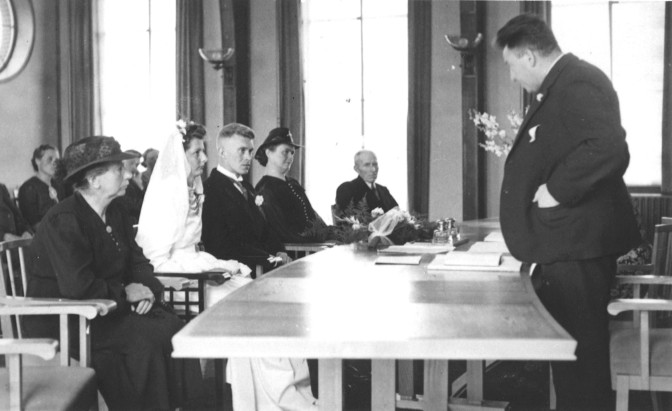If you have ever read all of the text of an early civil registration marriage record, you may have read how the groom and the bride promised to fulfill the duties of a husband and wife towards each other as specified in Title 5, Chapter 6 of the Civil Code. So what does that actually mean? Here is what the law of 1823 says about that.
Of the rights and duties of the spouses to each other
- The spouses owe each other, each to the other, faithfulness, aid and support.
- The husband owes his wife protection, the wife her husband obedience.
- The wife is obliged to live with the husband and follow him wherever he judges to live; the husband is obliged to receive her with him, and provide for every need of her life according to his state and abilities.
- The wife cannot proceed in law, without authorization by her husband, even if she is a public merchant or married to her husband without communion of property, or if she owns a separate estate.
- The authorization by the husband is not required when the wife is prosecuted in a criminal case, or by the police.
- The wife, even if she is married without communion of property or owns a separate estate, cannot give away, alienate, put up as collateral or acquire, any property, even for free or under an onerous title, without assistance by her husband in the record or his written consent.
- In case the husband refuses to assist his wife in law, the judge can give the required authorization.
- In case the husband refuses to authorize his wife to proceed in law, the wife can sue him before the court of first appeal of their mutual place of residence, which can consent or deny the authorization, after the husband has been heard or called before the court.
- The wife, being a public merchant, can, without authorization by her husband, commit herself regarding her merchandise, and in such a case also commit her husband if they are married in community of property. She is not regarded as a public merchant if she just deals marginally in merchandise traded by her husband, but only if she operates as a merchant by herself.
- When the husband is sentenced to a penitentiary or degrading punishment, even if the verdict was adjudged in absence of the husband, the wife, even while being an adult, cannot proceed in law or make any commitments, while this punishment takes place, except after having previously obtained permission by a judge, who can give this permission without hearing or calling the husband.
- If the husband is not allowed the management of his own property, or if he is absent, the judge may, after reviewing the case, authorize the wife, either to proceed in law, or to make commitments.
- All authorization, given in general terms, even if agreed in the marriage contract, has no wider applicability than the management of the property of the wife.
- In case the husband is a minor, the wife needs authorization by a judge, either to proceed in law, or to make a commitment.
- The invalidity based on the lack of such authorization, can only be denied by the wife, the husband or their heirs.
- The wife can make a last will without authorization by her husband.

Marriage of Henk Hoitink and Mien Woordes, 1942
What do you think?
To our modern views, these articles sound very restrictive towards women. Can you imagine being a wife, with your husband in prison, and not being allowed to manage your family’s affairs in his absence without first getting a judge’s permission? I wonder how frequently women asked for a judge’s permission to act on their own behalf. I’ve got several men in my tree who weren’t around all the time (in the military, in prison, in a mental hospital), so maybe I should have a look!
Did you ever find any court records where a woman requested a judge’s permission to act on her own behalf?
Source
Unidentified author, Burgerlijk wetboek, uit het Fransch vertaald. Nieuwe verbeterde uitgave. [Civil code, translated from French. New and improved edition], (Brussel: Brest van Kempen, 1823), p. 54-55; online edition, Google Books (http://books.google.com/books?id=mmdQAAAAcAAJ : accessed 31 August 2012).


At least the wife had the option of getting a judge’s permission. In most European countries the women didn’t even have that! In my reading of Dutch histories, the women had much more freedom than any other Christian country and were more aligned to the Scandinavian ways. I am proud of that heritage!
I did not know that other European countries did not allow women to go to a judge. I would think that most western European countries (at least, the one occupied by Napoleon) would have similar laws. Interesting…
My great grandmother wanted to marry my great grandfather and her father said no. So they went before a judge and the judge allowed the marriage.